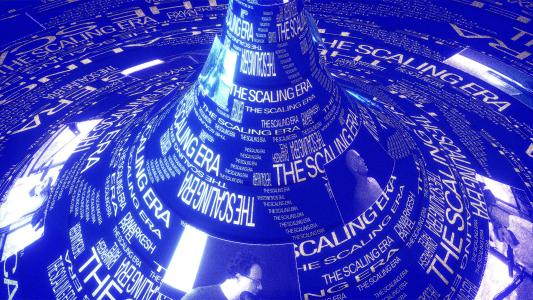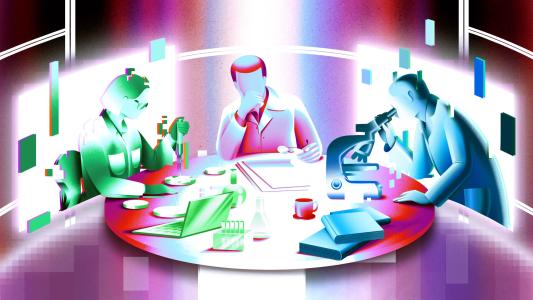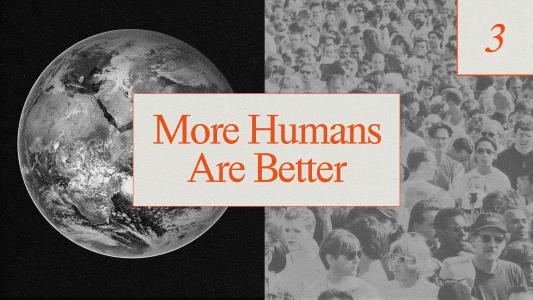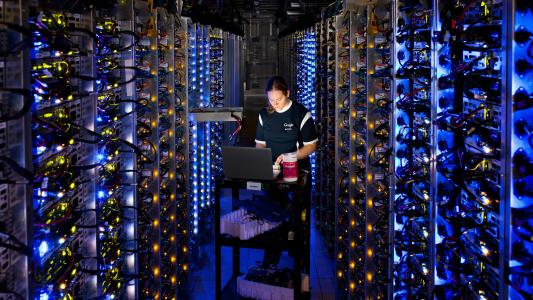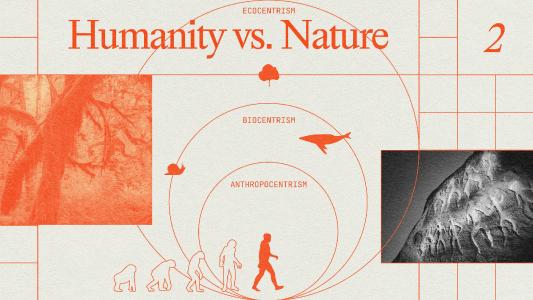Why progress was so slow, for so long
Progress was agonizingly slow for most of human history, but the rapid progress of the last few centuries was not a fluke.
Why America reinvents itself every 80 years — and is doing so again
Three separate theories help explain why America enters a period of great progress every 80 years — and why another is coming soon.
What a historian in 2100 might say about Trump’s America
President Donald Trump might clear the way for the building of 21st-century systems and open up the political space for a new way forward.
“Stopping climate change” is the wrong goal
Anything that matters to humans should be under our control. The climate matters—so we should control the climate.
How DeepSeek rewrote the rules of the AI race
Chinese startup DeepSeek has proven that vast quantities of capital and cutting-edge chips aren't prerequisites for world-class AI.
America underestimates the difficulty of bringing manufacturing back
Tariffs won't bring manufacturing back to the US, but there are ways to make it happen — if America is serious about doing so.
Kevin Kelly points a new way forward into the Age of AI
One of the most original and optimistic thinkers in America helps build out some big through lines on what's possible with AI in the next 25 years.
The artifact isn’t the art: Rethinking creativity in the age of AI
ChatGPT's Studio Ghibli imitations invite questions about the creative value of people and what we really mean when we talk about creativity.
The next era of psychedelics may be precision-designed states of consciousness
A look inside Mindstate Design Labs' effort to design drugs that reliably produce specific states of consciousness.
America is going through its every-80-year reinvention
Futurist Peter Leyden finds parallels between America in 2025 and at three pivotal points in its history, each 80 years before the last.
How technology has transformed private espionage
Combining AI and a deluge of open data has enabled some intelligence vendors to surpass the capabilities of government agencies.
How local innovators are transforming the world
In partnership with Skoll Foundation
These changemakers show that social innovation thrives when it draws on the knowledge and lived experience of the people impacted.
Will LLMs lead to an artificial general intelligence?
An exclusive excerpt from AI podcaster Dwarkesh Patel's first book, The Scaling Era: An Oral History of AI 2019-2025.
A dozen reasons to read Peter Leyden at this critical juncture in history
To truly understand our historic moment, you need a comprehensive, big-picture, long-term perspective that deeply understands artificial intelligence and the next wave of transformative technologies.
What is The Great Progression: 2025 to 2050?
We have a historic opportunity to harness AI and other transformative technologies in order to make a much better world in the next 25 years.
Humanoid helpers are now entering our homes
Robotics startup 1X Technologies is now sending its humanoid robots into homes to help people with chores and provide companionship.
Fire-resilient prefabs are helping LA build back better
Victims of LA's wildfires are opting for tech company Cover's prefab homes over traditional new builds. Here's why.
Progress happens because solutions create new problems to solve
Solutionism means fully accepting what’s in front of us and enthusiastically stepping up to meet the challenge.
Why are traditional climate solutions falling short in the American South?
In partnership with Skoll Foundation
Decades of disinvestment left Black communities in the South fighting for clean air and water. Now they're showing the nation what justice looks like.
Arc Institute’s new AI can read and write the code of life
Training on the DNA of nearly 130,000 species taught Evo 2 how to generate DNA sequences the same way other AIs do text or images.
All PCs will be AI PCs “pretty soon,” says Intel exec
Manufacturers are now equipping their PCs with the hardware needed to run the latest AI applications locally. Here's what that means for you.
We’re able to create new creatures through gene editing. What’s stopping us?
The question isn’t whether we can sculpt new life. The question is what comes next.
Today’s wearables track your body. Tomorrow’s could treat it.
Wearables that treat health issues, track countless biomarkers, and last far longer than today's devices are on the horizon.
How AI is reshaping the legal profession
AI-powered tools may already be giving some lawyers the upper hand in court.
These red-hot “green jobs” could help Gen Z cope with its eco-anxiety
"Green" jobs that help combat the climate crisis are on the rise, according to the World Economic Forum's Future of Jobs 2025 report.
Why nations are looking offshore to decarbonize their grids
Interest and investment in offshore solar, wind, and nuclear power systems is increasing as global efforts to decarbonize ramp up.
Blind optimism is not a cure for blind pessimism
We need to fully acknowledge problems, while vigorously pursuing solutions. Call it “solutionism.”
Sal Khan wants to give every student on Earth a personal AI tutor
Khan Academy's new AI tutor, Khanmigo, has the potential to revolutionize education for students and teachers alike.
Inside the “Virtual Lab” where AIs and humans collaborate
A “Virtual Lab” populated by AI scientists could overcome one of the biggest challenges in interdisciplinary research.
The startup using “digital twins” to protect homes from wildfires
Stand Insurance is using computer simulations and "digital twins" to help homeowners make their properties fire resilient.
Pantheon creator Craig Silverstein on uploading our brains to the internet
How the cult hit sci-fi show imagines a “techno-realist” future.
The US needs another 4 million houses. Here’s how it could get them.
Restrictive zoning policies helped create America's housing shortage. Zoning reform could help end it.
How AI is being drafted for a digital cold war
"Technology has always been co-opted for war, but truly intelligent AI, let alone a superintelligence, is a different beast entirely."
T-Minus: Counting down the top 10 space stories of 2024
A look back on the 10 greatest space stories of 2024, from SpaceX's "Mechazilla" to a first-of-its-kind civilian spacewalk.
How cryopreservation could end death as we know it
The technology could one day allow people with terminal illnesses to go into "hibernation" until a cure is found.
Google’s $1 billion bet on Africa’s digital future
Just 37% of sub-Saharan Africans use the internet today, but Google predicts the next 10 years will be the region’s “digital decade.”
How to reclaim meaning in a changing world
What if the barrier to a fulfilled life isn’t technology, it’s culture?
Should we turn the electricity grid over to AI?
AI could one day be woven throughout the grid management system — here are the pros and cons.
Has the US reached “peak obesity”?
A CDC survey suggests America’s obesity rate may be falling. Is this a turning point in the obesity epidemic? Or just a temporary plateau?
AI skeptic Gary Marcus on AI’s moral and technical shortcomings
From hallucinations to regulatory battles, Gary Marcus argues the AI status quo has failed us and it's time citizens demand something more.
The big problems driving nanotech development
Freethink talks to Brian Anthony, associate director of MIT.nano, on the enormous benefits – and challenges – of microscopic tech.
Can humans purge the bots without sacrificing our privacy?
A group backed by Sam Altman is pursuing the creation of "personhood credentials" that would prove an internet user is a real person.
T-Minus: Kessler Syndrome
Experts answer 10 big questions about the nightmare scenario that could send us back to the pre-Space Age.
Flexport is using generative AI to create the “holy grail” of shipping
Flexport is using generative AI to read documents, talk to truckers, and create a "knowledge agent" that's an expert in shipping.
How Boom is resurrecting supersonic flight
If Boom gets its way, the future of supersonic passenger travel will be quieter, cleaner, and more affordable than its past.
The West needs more water. This Nobel winner may have the answer.
Paul Migrom has an Emmy, a Nobel, and a successful company. There’s one more big problem on the to-do list.
How the Internet Archive’s “Free Digital Library” fell to the “fair use” test
The U.S. Court of Appeals for the 2nd Circuit has found the Internet Archive to be in violation of federal law. Here's why.
Can we automate science? Sam Rodriques is already doing it.
People need to anticipate the revolution that’s coming in how humans and AI will collaborate to create discoveries, argues Sam Rodrigues.
Tracy Chou built a startup to “deep clean” your socials
Tracy Chou's Block Party is helping people enjoy the benefits of social media while staying safe both online and IRL.
Why the USSR and China fell behind the US in the Chip Cold War
The US is currently winning the "chip war" with China, but to stay ahead, experts say it needs to start manufacturing microchips stateside.
How tech is turning science into a hobby
From astronomy to video games, consumer technology is helping people pursue their interests while also advancing community science.
Are microplastics really destroying our health?
Scientists still don’t know how microplastics impact human health, but they do have ideas for stopping their spread.
Silicon chips are no longer sustainable. Here’s what’s next.
To take our tech to the next level, we need a more energy-efficient semiconductor. Gallium nitride could be it.
Is this the biggest industrial espionage campaign in history?
The cat-and-mouse game between China and the world’s semiconductor companies is already having enormous consequences.
AI is now designing chips for AI
AI-designed microchips have more power, lower cost, and are changing the tech landscape.
Why futurist Amy Webb sees a “technology supercycle” headed our way
Amy Webb's data suggests we are on the cusp of a new tech revolution that will reshape the world in much the same way the steam engine and internet did in the past.
Port workers are at war with automation. Can they win?
A timeline of events leading to the ILA's recent strike, what each side wants, and what could happen if they do — or don’t — get it.
Charting the race for energy in the Age of AI
As AI's demand for computing power skyrockets, data centers are under immense pressure to boost efficiency and increase sustainability.
T-Minus: 10 milestones in commercial spaceflight
T-Minus looks back at 10 major milestones in the commercial space industry — including several SpaceX triumphs.
The robotaxis have arrived
Alphabet-backed Waymo is leading the robotaxi revolution, but Tesla’s new Cybercab could change everything.
The exciting research that may cure Parkinson’s
GeneCode is developing a drug it hopes won't just alleviate Parkinson's symptoms but also protect and restore patient's neural health.
This $400 genetic test could save your life
Nucleus Genomics' new whole genome sequencing and analysis service promises to reveal the secrets hidden in your DNA.
Charting the evolution of nuclear energy
Nuclear fission’s stalled growth might give way to fusion’s clean energy potential
AI chatbots may ease the world’s loneliness (if they don’t make it worse)
AI chatbots may have certain advantages when roleplaying as our friends. They may also come with downsides that make our loneliness worse.
The master plan to end EV “range anxiety” forever
A look at the history of EV charging and the tech trends that could encourage more people to make the switch to an electric car.
Why happiness is not the best indicator of well-being
Achieving values and pursuing growth is the real secret to a fulfilled life.
T-Minus: 10 space startups to watch
Today's aerospace industry includes hundreds of startups, all vying to be the next SpaceX. Here are 10 that could actually do it.
Will AI supercharge hacking — if it hasn’t already?
The future of hacking is coming at us fast, and it isn’t clear yet whether AI will help attackers and defenders more.
Ian Brooke wants to revolutionize flight as we know it
This Y Combinator-backed startup has invented a new kind of jet engine, radically more efficient and versatile than anything before it.
No, LLMs still can’t reason like humans. This simple test reveals why.
Most AI models are incredible at taking tests but easily bamboozled by basic reasoning. “Simple Bench” shows us why.
The startup using balloons to cool the planet
A look at the history of stratospheric aerosol injection (SAI), the arguments against it, and the startup putting it into action right now.
The rise of the semi-autonomous car
A look back at the history of driving automation and the kinds of tech we can expect to see hitting the road in the coming years.
The future of fertility, from artificial wombs to AI-assisted IVF
A look back at the history of infertility treatments and ahead to the tech that could change everything we thought we knew about reproduction.
Beyond screen time: Rethinking kids’ tech use with the “Goldilocks hypothesis”
The "Goldilocks hypothesis" asks parents to think beyond screen time and consider the habits that teens build around technology use.
“Model collapse” threatens to kill progress on generative AIs
Generative AIs start churning out nonsense when trained on synthetic data — a problem that could put a ceiling on their ability to improve.
T-Minus: 10 space stations of the future
The International Space Station may be nearing retirement, but 10 new space stations are just preparing for launch.
The AI chip startup that could take down Nvidia
A new kind of AI chip developed by a team of Harvard dropouts could shift the ground beneath our massive AI economy.
The overlooked virtues of a crowded world
In a world of rising cynicism, a celebration of our capacity to create, adapt, and thrive.
America’s plan to resurrect nuclear power
To increase its supply of clean nuclear power, the US government is cutting licensing fees, rewarding reactor innovation, and more.
The future of data centers — on land, at sea, and in space
As our digital world grows, demand for data centers is also increasing. To meet that demand sustainably, developers are getting creative.
Why harmony with nature is a myth
Slowing growth and limiting development isn’t living in harmony with nature—it is surrendering in a battle.
LLMs are a dead end to AGI, says François Chollet
AI researcher François Chollet thought we needed a better way to measure progress on the path to AGI — so he made one.
Solid-state batteries are finally making their way out of the lab
Solid-state batteries could soon challenge lithium-ion as the dominant tech for powering smartphones, EVs, and more.
T-Minus: Counting down 10 upcoming moon missions
A countdown of 10 upcoming moon missions, all leading up to the one expected to return NASA astronauts to the lunar surface.
How humanity transformed its fate
From surviving on wild plants and game to controlling our world with technology, humanity's journey of progress is a story of expanding human agency.
2.6 billion people don’t use the internet. What’s stopping them?
One-third of the world still isn't online. Here's how the International Telecommunication Union (ITU) is working to close the digital divide.
How the internet changed news, according to The Onion
Freethink spoke to Onion staffers about parodying news from the print era into the digital age.
The next big tech trend will start out looking like a toy
In "Read, Write, Own: Building The Next Era of the Internet," investor Chris Dixon explains why the biggest trends often go overlooked.
My anxious generation: The unforeseen toll of a digital childhood
In this op-ed, columnist Rikki Schlott draws from personal experience to argue that a digital childhood is a childhood squandered.
Replit CEO Amjad Masad on bringing the next 1 billion software creators online
Freethink spoke with Masad about the future of software development, the outsized power of Silicon Valley, and the absurdity of the AI extinction theory.
Meet Thresh, the world’s first professional gamer
Was Elon Musk any good at Quake? “He’s a legit gamer,” but…
You’re thinking of the metaverse all wrong, says Matthew Ball
Rumors of the metaverse’s demise have been greatly exaggerated.
Hugo Mercier says we’ve been misinformed about misinformation
Cognitive scientist Hugo Mercier argues the problem isn’t that people are too gullible but too stubborn.
Constitutional warning shot for social media “deplatforming” laws
Can the government tell private websites what they have to publish?
Potato chips or heroin? The debate on social media and mental health
Experts disagree on whether social media causes mental health issues in adolescents despite looking at the same data. Here's why.
Life was dirty, difficult, and dangerous for almost everyone who ever existed
9 minutes of cruel history may cure the anti-progress delusion.
9 dumbphones to help curb your screen addiction
While smartphones keep getting more powerful, the growing dumbphone phenomenon is subverting expectations.
How smart devices helped me unlock hidden health wins
By measuring many different body metrics, smart health devices can help support the mental game as much as the physical fitness gains.












